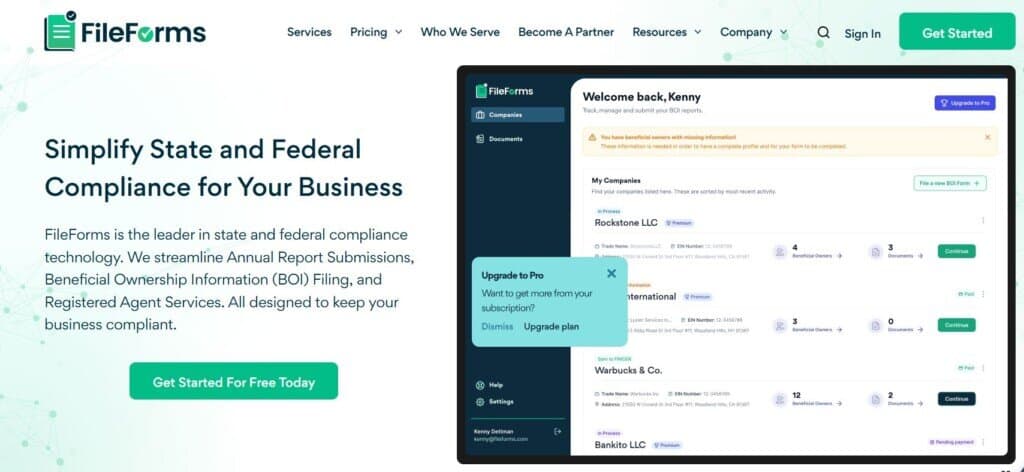Last Updated on April 22, 2025 by Ewen Finser
Complying with government requirements is among the least exciting aspects of starting a new business, but it must be done nonetheless. Naming a registered agent is one of these requirements.
A registered agent is essentially just an entity that receives official communications on your behalf. For reasons that are not entirely clear to anyone, many states do not allow businesses to act as their own registered agents; so, you may have to nominate a third party to do it on your behalf.
While this may all seem trivial, the registered agent requirement is something you should take seriously. Neglecting to nominate an appropriate registered agent could have disastrous results for your business.
Bottom Line Up Front Summary
LLCs in almost every state must have a registered agent. While you can act as your own registered agent in most states, there are some that don’t allow it. Furthermore, hiring a professional service provider has major benefits, including privacy, compliance assurance, and the avoidance of legal headaches.
What Is a Registered Agent, and What Do They Do?
A registered agent (sometimes called a statutory agent or resident agent) is a person or service appointed to receive legal notices, tax forms, compliance documents, and government correspondence for your LLC.
Broadly, the functions of a registered agent include:
- Receiving legal documents (such as lawsuits, subpoenas, and summonses).
- Receiving official government notifications (including tax forms and compliance reminders).
- Ensuring documents are received and forwarded promptly to you, the business owner.
- Keeping your business compliant with state laws (some states require registered agents to file annual reports or keep updated business information on file).
Essentially, a registered agent is the official point of contact between your business and the government.
All 50 states require LLCs to have a registered agent in one form or another—though, as we’ll see, there are significant differences between states in terms of what kinds of individuals and entities can serve as registered agents.
Who Can Be a Registered Agent?
Each state has different requirements, but in most cases, the registered agent must:
- Be a resident of the state where the LLC is registered.
- Be available during regular business hours to accept legal documents.
- Be able to forward legal notices and tax documents promptly to the business owner.

Rules to Watch Out For
As noted previously, different states have different rules and restrictions around registered agents. Here are some of the most common ones to be aware of:
- Written consent forms: Some states (such as Florida) require the registered agent to sign a written consent form acknowledging their role before the LLC is approved.
- Administrative dissolution: In some states (such as Nevada), businesses that fail to maintain a registered agent can be administratively dissolved by the state. This essentially means that your business will cease to exist; all legal protections enjoyed by members of your company (such as limited liability in relation to lawsuits filed against the company) may dissolve as well.
- Allowing the secretary of state to serve as a registered agent: Some states will automatically appoint the secretary of state to act as a company’s registered agent under certain circumstances (such as if the business in question is from a different state).
- Physical address requirement: A significant minority of states require registered agents to have brick-and-mortar addresses, rather than just PO boxes. This can be a headache if you need to have a registered agent in a number of states.
Can I Just DIY It?
Can your business serve as its own registered agent? This is possible in some cases, but the law forbids it in most states. Another option is to nominate yourself personally as your company’s registered agent; most states permit this.
Even if you don’t technically need one, though, you’re probably better off paying for a specialist registered agent service. There are a few reasons for this.
1. Privacy Protection
If you act as your own registered agent, your address becomes public record. The law in many states requires registered agents to have an actual, brick-and-mortar address, so you can’t just hire a PO box.
This means:
- Junk mail overload: You know those irritating marketing emails you get from every service provider under the sun? You can now expect the paper versions coming through your mailbox. And flyers, unfortunately, are much harder to delete than emails.
- Unwanted visitors: Process servers can (and will) show up at your home if you’re sued.
- Potential safety risks: There are a lot of bad actors out there. It’s generally better not to let them have your home address.
2. Reliable Access to Important Legal Notices
Registered agents must be available during regular business hours, and important legal documents related to your business will be sent on the understanding that this is the case. If you’re away from home a lot, you might miss a critical notice—and that could mean serious legal trouble.
3. Multi-State Business Expansion
If you plan to register your LLC in multiple states, keeping up with different requirements can be a nightmare. Also, depending on the states in question, it may not even be legally possible (as I noted above, some states don’t allow you to serve as your own registered agent, while others require registered agents to have a brick-and-mortar address within the state).
4. Less Administrative Hassle
If you’re in the early stages of a business launch, you don’t need me to tell you how precious time is. You’re likely already going days at a time without seeing sunlight or having conversations that don’t revolve around work. The last thing you need is another demand on your time. Letting someone else take registered agent requirements off your plate could make things that little bit more efficient.
What Registered Agent Service Should You Use?
Realistically, the decision around which registered agent service to use is not the most crucial one you’ll ever need to make. The function is relatively easy to execute, and even the most efficient service provider in the world isn’t going to make a significant difference to your bottom line.
That being said, it’s important to find a company you can trust to do the job reliably. Some recommendations of mine here include:
- FileForms: FileForms is, in my book, the best overall choice for businesses that want a cost-effective, automated, and compliance-driven registered agent service. This is chiefly because it charges an annual subscription charge of $149 per state, which is reasonable compared to a lot of other providers (many of which won’t even do you the courtesy of publishing the price on their websites). It also has a broader suite of services (including BOI reporting and FBAR compliance) that are worth checking out if you’ve recently launched a company or are in the process of doing so.
- LegalZoom: LegalZoom is ideal for businesses that want the comfort that comes with a recognizable brand name. It also offers extensive legal support beyond just registered agent services, including access to attorneys, legal document creation, and additional compliance services. However, it’s going to set you back $249 a year; if all you need is a registered agent service, there’s probably no need to part with the extra cash.
- ZenBusiness: ZenBusiness is another outfit with a good reputation in this space, and I’m a big fan of its user-friendly dashboard. However, it’s not clear how much it charges for the service on its website, which is a big red flag for me.

Should You Use a Registered Agent Service?
If you’ve recently set up a business and you haven’t yet made arrangements regarding registered agent services, you should probably outsource it. The costs involved are minor, and your peace of mind when it comes to potential business hazards like this one is too valuable to leave at risk.
If you’re looking for a reliable registered agent service, choose one that offers nationwide coverage, compliance monitoring, and excellent customer support.

